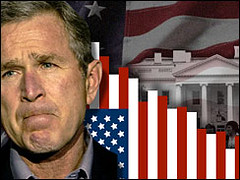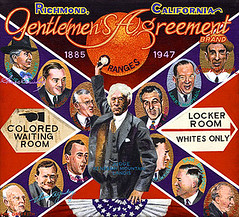After it was determined that al Qaeda was responsible for the worst mass murder on U.S. soil, we invaded Iraq to route the Taliban and chased the remnants of al Qaeda into the caves of the Tora Bora.
After the next attack masterminded by al Qaeda, we are going to have
a much more difficult time routing the Pashtuns of Pakistan and chasing al Qaeda, in particular Osama bin Laden, anywhere.
During the past 12 months or so, CIA and Pentagon officials have quietly modified the line they employed for three years after the Sept. 11, 2001, attacks -- that bin Laden was hiding out "in the tribal areas along the Pakistan-Afghanistan border." Now the same officials say with some confidence that he is "not based in Afghanistan." Whatever ambiguity there was in the past is gone: Bin Laden is in Pakistan.
What's left is the question: What are the United States and its ally, Pakistan, doing about it?
Not enough, according to high-ranking Afghan, Pakistani and Western officials I've spoken to here. Indeed, the disastrous policies of the United States and Pakistan, starting with the aftermath of the war in 2001, have only hastened the radicalization of northwest Pakistan and made it more hospitable to bin Laden and his Taliban allies. The region has become a haven for bin Laden and a base for Taliban raids across the border back into Afghanistan which they had fled.
Not that you'd be able to tell any of that from what Bush administration officials have been saying. Almost everything the administration claims about the al Qaeda leader is tinged with bravado and untruthfulness. "We are dealing with a figure who has been able to hide, but he's on the run," Secretary of State Condoleezza Rice said earlier this month. Here in Pakistan, however, the view is different. Bin Laden is not considered to be on the run, but well protected by friends who are making his life as comfortable as possible.
After all, his number two, the Egyptian doctor Ayman al-Zawahiri, appears to have a busy social calendar in Pakistan's Pashtun belt. U.S. missiles narrowly missed him at a dinner party held in his honor on Jan. 13.
Paul Krugman was right, the uproar over the administration's Dubai ports fiasco is the last straw (or, at least, the latest) for a cowed public, press, and Congress that have willfully ignored the Cheney administration's failure to bring bin Laden to justice, but has instead created a climate of fear to profit politically from his existence.
They've been very good at telling us we need our freedom curtailed so that they can listen in on "calls from al Qaeda," but they can't find the bastards in the hinterlands of our "close ally." Why the loyal opposition hasn't called the administration on this, day after day, is bewildering.
I mentioned Krugman. Well,
here he is, his long beard and flowing robes flying in the wind as he stands high atop the mountain, railing at the frightened masses below, who do not understand why God has forsaken them. He reminds them that he has warned them for lo these five years, that they have turned their eyes away from Reason and Good Sense for too long.
And those gods can be beeyatches [TimesSelectGradeMeats, so apologies to the Times's copyright lawyers]:
The storm of protest over the planned takeover of some U.S. port operations by Dubai Ports World doesn't make sense viewed in isolation. The Bush administration clearly made no serious effort to ensure that the deal didn't endanger national security. But that's nothing new — the administration has spent the past four and a half years refusing to do anything serious about protecting the nation's ports.
So why did this latest case of sloppiness and indifference finally catch the public's attention? Because this time the administration has become a victim of its own campaign of fearmongering and insinuation.
Let's go back to the beginning. At 2:40 p.m. on Sept. 11, 2001, Donald Rumsfeld gave military commanders their marching orders. "Judge whether good enough hit S. H. [Saddam Hussein] @ same time — not only UBL [Osama bin Laden]," read an aide's handwritten notes about his instructions. The notes were recently released after a Freedom of Information Act request. "Hard to get a good case," the notes acknowledge. Nonetheless, they say: "Sweep it all up. Things related and not."
So it literally began on Day 1. When terrorists attacked the United States, the Bush administration immediately looked for ways it could exploit the atrocity to pursue unrelated goals — especially, but not exclusively, a war with Iraq.
But to exploit the atrocity, President Bush had to do two things. First, he had to create a climate of fear: Al Qaeda, a real but limited threat, metamorphosed into a vast, imaginary axis of evil threatening America. Second, he had to blur the distinctions between nasty people who actually attacked us and nasty people who didn't.
The administration successfully linked Iraq and 9/11 in public perceptions through a campaign of constant insinuation and occasional outright lies. In the process, it also created a state of mind in which all Arabs were lumped together in the camp of evildoers. Osama, Saddam — what's the difference?
Now comes the ports deal. Mr. Bush assures us that "people don't need to worry about security." But after all those declarations that we're engaged in a global war on terrorism, after all the terror alerts declared whenever the national political debate seemed to be shifting to questions of cronyism, corruption and incompetence, the administration can't suddenly change its theme song to "Don't Worry, Be Happy."
The administration also tells us not to worry about having Arabs control port operations. "I want those who are questioning it," Mr. Bush said, "to step up and explain why all of a sudden a Middle Eastern company is held to a different standard than a Great British company."
He was being evasive, of course. This isn't just a Middle Eastern company; it's a company controlled by the monarchy in Dubai, which is part of the authoritarian United Arab Emirates, one of only three countries that recognized the Taliban as the legitimate ruler of Afghanistan.
But more to the point, after years of systematically suggesting that Arabs who didn't attack us are the same as Arabs who did, the administration can't suddenly turn around and say, "But these are good Arabs."
Finally, the ports affair plays in a subliminal way into the public's awareness — vague but widespread — that Mr. Bush, the self-proclaimed deliverer of democracy to the Middle East, and his family have close personal and financial ties to Middle Eastern rulers. Mr. Bush was photographed holding hands with Crown Prince Abdullah of Saudi Arabia (now King Abdullah), not the emir of Dubai. But an administration that has spent years ridiculing people who try to make such distinctions isn't going to have an easy time explaining the difference.
Mr. Bush shouldn't really be losing his credibility as a terrorism fighter over the ports deal, which, after careful examination (which hasn't happened yet), may turn out to be O.K. Instead, Mr. Bush should have lost his credibility long ago over his diversion of U.S. resources away from the pursuit of Al Qaeda and into an unnecessary war in Iraq, his bungling of that war, and his adoption of a wrongful imprisonment and torture policy that has blackened America's reputation.
But there is, nonetheless, a kind of rough justice in Mr. Bush's current predicament. After 9/11, the American people granted him a degree of trust rarely, if ever, bestowed on our leaders. He abused that trust, and now he is facing a storm of skepticism about his actions — a storm that sweeps up everything, things related and not.
© 2006 New York Times Co.
So ends today's (Friday's, actually)
Krugmaniad.
Meanwhile, back in Afghanistan, if you needed any evidence for the failure of the Bush administration to seriously confront the elements that ended in more than 3,000 people losing their lives in the World Trade Center on September 11, 2001, there is
the infamous Bagram prison.






